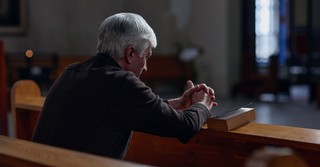How Did Moses Pray?
Share

The desert wind stirred the sand around his feet as the old man stood upon Mount Nebo. His eyes, still bright despite his years, scanned the horizon. There it was, the land of promise, stretching like a tapestry of green valleys and golden hills. He had led his people to its edge, but his journey would end here.
For a moment, Moses was silent. Then, as he had done all his life, he spoke softly to the One who had never left his side.
He had first heard that Voice long ago, from a burning bush that blazed without being consumed. From that day forward, his life became a conversation with God.
He prayed in fear at the bush, in faith before Pharaoh, in anguish at Sinai, and in awe on the mountain. He prayed for strength when he felt weak, for mercy when the people sinned, and for God’s glory when his soul longed for more. Scripture calls him “the man of God” (Deuteronomy 33:1) and says, “The Lord would speak to Moses face to face, as one speaks to a friend” (Exodus 33:11).
Photo credit: ©Getty Images/rudall30
Meeting God

The sun dipped behind the rugged hills of Midian as Moses led his flock across the wilderness. Once a prince of Egypt, he now lived in obscurity after forty years of exile. Then he saw it, a bush that burned but was not consumed. Curiosity drew him close, but what he heard next would change everything.
“‘Moses, Moses!’
‘Here I am,’ he answered.
‘Take off your sandals, for the place where you are standing is holy ground’” (Exodus 3:4-5).
The voice declared itself the God of Abraham, Isaac, and Jacob, then commanded Moses to return to Egypt and deliver His people. Moses’ instinct wasn’t obedience, it was prayer. “Who am I that I should go to Pharaoh and bring the Israelites out of Egypt?” (Exodus 3:11).
God didn’t scold him. He simply replied, “I will be with you” (Exodus 3:12).
That moment marked the birth of Moses’ prayer life. In the quiet of the desert, amid his weakness, he discovered prayer begins not with confidence, but with surrender. God didn’t need Moses’ strength; He wanted Moses’ heart.
God still meets His people in ordinary places – a field, a commute, a kitchen table – and calls them into extraordinary purposes. Like Moses, we often feel unworthy. But the strength of our calling isn’t found in who we are; it’s in who goes with us.
Crying Out for Help
The Israelites stood trapped between the Red Sea and the thunder of Pharaoh’s chariots. Fear spread like wildfire. The same people who had rejoiced in freedom only days before now turned on their leader.
“They said to Moses, ‘Was it because there were no graves in Egypt that you brought us to the desert to die?’” (Exodus 14:11).
Moses felt the weight of their fear pressing on him. Behind him, the sound of hooves grew louder. Before him stretched an impossible sea. He could do nothing but pray.
Moses answered the people, “Do not be afraid. Stand firm and you will see the deliverance the Lord will bring you today… The Lord will fight for you; you need only to be still” (Exodus 14:13-14).
Moses lifted his staff. The sea split, and a path opened through the waters. What looked like a tomb became a highway of deliverance.
Sometimes prayer is a desperate cry, and that is enough. God hears our trembling voices when we face impossible odds. Fear may surround us, but faith looks up and sees the way God is already making.
Photo credit: ©Getty Images/Apisit Suwannaka
Interceding during Battle

The desert sun blazed as Israel fought Amalek in the valley below. On a nearby hill, Moses raised his hands toward heaven, silently interceding. “As long as Moses held up his hands, the Israelites were winning, but whenever he lowered his hands, the Amalekites were winning” (Exodus 17:11).
Fatigue overcame him, so Aaron and Hur held his hands high. Victory came not from swords but from prayer. Afterward, Moses built an altar and named it “The LORD Is My Banner” (Exodus 17:15).
It wasn’t the strength of the soldiers or the sharpness of their swords that brought victory that day, it was prayer. From the hilltop, the sight must have been extraordinary: three men silhouetted against the sky, united in intercession.
In life’s battles, prayer often determines the outcome. When we grow weary, God provides friends to lift our arms and sustain us in prayer. And sometimes, we are to be that support for someone else. Our prayers may be what carries them through their struggle.
Face-to-Face Friendship
The camp of Israel stirred with activity each morning. Fires crackled, children laughed, and the people prepared for another day in the wilderness. But outside the camp stood a single tent, the tent of meeting. Whenever Moses entered it, a thick pillar of cloud descended and hovered at the entrance, and the noise of the camp fell silent. Every head turned to watch.
Inside that tent, Moses met with God. There were no crowds, no priests, no distractions, just the quiet voice of the Almighty and the humble heart of His servant. Scripture says, “The Lord would speak to Moses face to face, as one speaks to a friend” (Exodus 33:11).
There Moses didn’t just bring requests; he listened. He lingered in the presence of God until his face literally shone with divine light (Exodus 34:29). Prayer had transformed him. The more time he spent in God’s presence, the more he reflected God’s glory.
The sign of true prayer is not eloquence or ritual, it’s a life bearing the radiance of having been with God. God desires intimacy with His children, not just obedience. When we spend time in His presence, His character begins to shape ours.
Photo credit: Unsplash/Jametlene Reskp
Interceding for Others

The mountain trembled with God’s presence. Moses had been with the Lord receiving the commandments written by His own hand. Down below, however, the scene was very different. The people of Israel, tired of waiting, molded a golden calf and worship it.
God’s righteous anger burned: “Now leave me alone so that my anger may burn against them … Then I will make you into a great nation” (Exodus 32:10).
It was a staggering offer. Moses could have become the father of a new chosen people. But his heart broke instead. He didn’t think of himself; he thought of them. He fell on his face before the Lord and began to pray.
Moses pleaded, “Turn from your fierce anger; relent and do not bring disaster on your people” (v 12).
“Then the Lord relented and did not bring on his people the disaster he had threatened” (v 14).
Later, Moses went further, offering one of the most selfless prayers in all of Scripture: “Oh, what a great sin these people have committed! … But now, please forgive their sin — but if not, then blot me out of the book you have written” (v 32).
Moses was willing to be blotted out if it meant the people could be saved. That is the heart of true intercession. Standing between judgment and mercy, pleading for others with sacrificial love.
Boldly Asking for God’s Presence
The golden calf was gone, ground to powder and scattered on the water. The people mourned, stripped of their ornaments, aware that their sin had driven a wedge between them and God.
God told Moses “I will send an angel before you … But I will not go with you, because you are a stiff-necked people and I might destroy you on the way” (Exodus 33:2-3).
For most, that might have sounded acceptable, God’s angelic protection, success, and safety. But not for Moses. To him, the thought of entering Canaan without God’s presence was unthinkable. He prayed, “If your Presence does not go with us, do not send us up from here” (Exodus 33:15).
Moses knew that without God’s presence, the Promised Land would be just another patch of earth. He didn’t want the promise without the Promiser. He longed for God Himself.
The Lord was moved by Moses’ plea: “My Presence will go with you, and I will give you rest” (v. 14).
Success without God is failure. Wilderness with God is home. The true measure of blessing isn’t what we gain, but who goes with us. We can have possessions, plans, and progress, but without God’s presence, we have nothing.
Photo credit: ©Getty Images/SeventyFour
Honest Prayers of Weakness

The desert sun burned hot above the wandering camp. Complaints rose like dust. The people grumbled about the manna, longing for Egypt’s food. They forgot the cruelty of their slavery and remembered only the good of their past.
Moses, weary from years of leadership, reached his limit. He turned to God, not with polished words, but with raw honesty. “Why have you brought this trouble on your servant? What have I done to displease you that you put the burden of all these people on me? … I cannot carry all these people by myself; the burden is too heavy for me. If this is how you are going to treat me, please go ahead and kill me” (Numbers 11:11-15).
Moses’ prayer was raw. He poured out his weakness and frustrations before the Lord. Yet God didn’t rebuke him. Instead, the Lord responded with compassion. He provided seventy elders to share the burden and promised to send meat in abundance.
God didn’t need Moses’ strength. He wanted his surrender. The honesty of Moses’ prayer opened the way for divine help.
Sometimes the most powerful prayer is honest surrender: “Lord, I can’t do this anymore.” God already knows our limits, and He delights to meet us there.
A Final Blessing
The sun was setting over Moab’s rugged hills. From the heights of Nebo, Moses looked across the Jordan to the Promised Land he longed to see. But he would not enter. Still, his heart was at peace. Prayer had shaped him from the burning bush to the edge of Canaan.
Before he departed, he prayed one last time. Tribe by tribe, he blessed the people he loved. “This is the blessing that Moses the man of God pronounced on the Israelites before his death” (Deuteronomy 33:1).
Then, alone with God, he climbed to the summit. “Moses the servant of the Lord died there in Moab, as the Lord had said” (Deuteronomy 34:5).
He departed as he lived, in fellowship with God, who spoke to him “face to face.”
Moses’ Legacy of Prayer
The story of Moses is not just the story of a leader; it is the story of a man who learned to talk with God. From the quiet wilderness of Midian to the thunder of Sinai, from the fiery bush to the stillness of Mount Nebo, his life was one long conversation with the Almighty.
Prayer shaped every part of Moses’ journey. When God called him, he prayed with hesitation. When Pharaoh resisted, he prayed with power. When the people sinned, he prayed with compassion. When he was weary, he prayed with honesty. When he longed for more of God, he prayed with holy boldness.
Through every triumph and trial, Moses prayed. He wasn’t perfect. His temper flared. His patience wore thin. His doubts sometimes lingered. But through it all, he never stopped talking to God. That was the secret of his life, the unbroken friendship between a man and his Maker.
Each prayer deepened his relationship with the Lord. Over time, the timid shepherd became a mighty intercessor; the reluctant servant became God’s friend. Prayer was not an obligation for Moses; it was the heartbeat of his faith.
Moses didn’t just lead Israel; he walked with the Almighty. His prayers live on as a testimony that the greatest legacy we can leave is a life spent in fellowship with God.
Photo credit: ©Getty Images/Charday Penn
Brad Simon has shared God’s Word for over forty-five years, with a unique blend of storytelling and Bible exposition. He is a retired Master Jeweler and relies on the God-given creativity that won him several national and international jewelry design awards to craft Biblical Narratives and Life Stories that are engaging and thought-provoking. Once a speaker, author, and publisher for the jewelry industry, now he is putting those skills to work to promote the beauty and appeal of God’s Word. Download a free copy of his devotional on prayer.